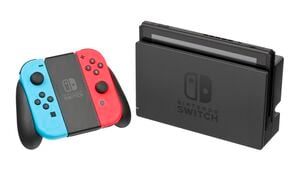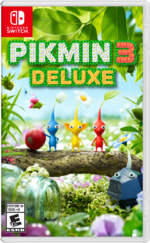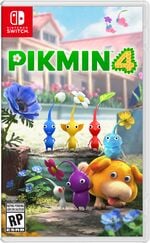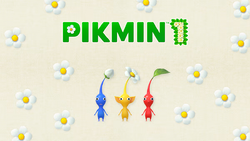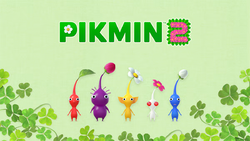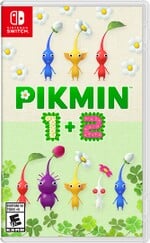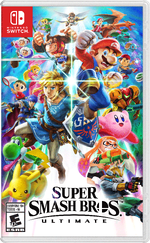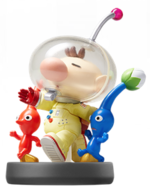Nintendo Switch
|
This article or section is a short summary on Nintendo Switch. |
The Nintendo Switch is Nintendo's 8th home console. It features detachable controllers and a dock that allows the console to be connected to a TV or used as a handheld. It was officially announced with a trailer on October 20th, 2016, and was launched on March 3rd, 2017. A smaller handheld-only version, the Nintendo Switch Lite, released on September 20th, 2019. An enhanced model, the Nintendo Switch (OLED model), released on October 8th, 2021.
Pikmin content[edit]
Pikmin 3 Deluxe[edit]
- Main article: Pikmin 3 Deluxe.
Pikmin 3 Deluxe is an enhanced re-release of Pikmin 3, released on October 30th, 2020.
Pikmin 4[edit]
- Main article: Pikmin 4.
Pikmin 4 is the fourth main game in the Pikmin series, released on July 21st, 2023. The game references the Nintendo Switch through the Telekinesis Detector and the Connection Detector, two treasures that are actually Joy-Con controllers.
Pikmin 1 (Nintendo Switch)[edit]
- Main article: Pikmin 1 (Nintendo Switch).
Pikmin 1 is a port of the original Pikmin to the Nintendo Switch, released on June 21st, 2023.
Pikmin 2 (Nintendo Switch)[edit]
- Main article: Pikmin 2 (Nintendo Switch).
Pikmin 2 is a port of the original Pikmin 2 to the Nintendo Switch, released on June 21st, 2023.
Pikmin 1+2[edit]
- Main article: Pikmin 1+2.
Pikmin 1+2 is a bundle of the Nintendo Switch ports of Pikmin 1 and Pikmin 2, released digitally on June 21st, 2023.
Super Smash Bros. Ultimate[edit]
Super Smash Bros. Ultimate is the fifth game in the Super Smash Bros. series, released on December 7th, 2018.
amiibo[edit]
- Main article: amiibo.
The Olimar amiibo has functionality with some Nintendo Switch games. For instance, in Mario Kart 8 Deluxe it unlocks an Olimar-themed costume, and in Super Mario Odyssey, Uncle amiibo will recognize the Pikmin amiibo specifically.
Nintendo Switch Online[edit]
The Nintendo Switch Online app features several Pikmin themed icon parts which can be purchased in exchange for Platinum Points. For a full list of Pikmin icon parts, see My Nintendo.
Built-in avatars[edit]
Separately from the Nintendo Switch Online app, several avatars can be selected, from which 3 Pikmin avatars exist: one of a running Red Pikmin, one of a tripping Blue Pikmin, and one of a Yellow Pikmin peeking from the bottom. The background color of the icons can be changed independently.
Features[edit]
The Switch's primary feature is its ability to switch functionalities between home console and handheld device. The main unit itself is a tablet-like device, featuring a 6.2 inch capacitive multi-touch screen. The main unit contains a 3.3mm headphone jack, a slot for game cards, a USB-C charger port, a kickstand on the back, and a micro SD card slot, which is located underneath the kickstand. Packaged with the main unit is a docking station, which features an AC adapter cable, an HDMI port, two USB2.0 ports, and one USB3.0 port.
When the main unit is docked into the station, video output is switched from the handheld portion's screen to the TV screen, and the console's internal processor's power output is increased, allowing the user to play their games in a more home console-like experience. At any time, the player can simply remove the main unit from the docking station to seamlessly transfer their game experience back into a handheld mode. Undocked, the main unit has a battery life that changes depending on the game one is playing, ranging from anywhere between 2.5 hours to 6 hours.
The console's controllers come in the form of two detachable controller halves, collectively called "Joy-Cons"; specifically the Joy-Con L and Joy-Con R. Both Joy-Cons each contain four face buttons, a clickable analogue joystick, one bumper and trigger, and two additional buttons inside the railing that act as shoulder buttons while being held horizontally. The Joy-Con R features an IR sensor and NFC reader, while the Joy-Con L has a dedicated button for taking screenshots, and will be able to record video at a later date. They can be attached to the sides of the Switch unit, used in conjunction as a traditional controller using a grip, used separately in each hand like a Wii Remote and Nunchuk, or may each be used as a standalone controller, allowing for two individuals to play multiplayer games with a single pair of Joy-Cons. They also include Nintendo's patented haptic feedback technology, titled "HD Rumble", to help convey realistic sensations to the users. Each Joy-Con has a battery life of 20 hours.
External links[edit]
| hideNintendo consoles | |
|---|---|
| GameCube • Wii • Wii U • 3DS • Switch | |
